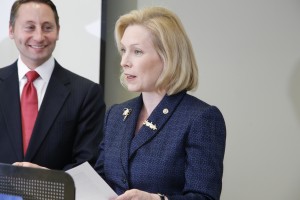
U.S. Sen. Kirsten Gillibrand unveiled in Westchester County a tax credit proposal she thinks will spur early-stage investment in and hiring at innovative New York companies and bridge the deep partisan divide in Congress to passage.
The junior Democratic senator from New York recently appeared at Curemark Inc., a 7-year-old biotechnology company in Rye awaiting an expected midyear completion of clinical trials around the U.S. for its first drug candidate in the treatment of autism and autism-related digestive disorders in children. The product, an enzyme-bearing digestible powder sprinkled on food, could be approved for use this year by the U.S. Food and Drug Administration.
Curemark would be among 2,000 companies in New York ”“ including about 70 biotechnology companies in the Hudson Valley region being marketed as “BioHud Valley “ ”“ that would benefit from Gillibrand”™s proposal to expand and simplify the federal tax credit for research and development. Gillibrand said analysts of the credit reform measure estimated it would increase private investment in companies by $7.5 billion.
The senator wants to set a standard credit rate at 20 percent of a company”™s increased research and development expenditures in a year. She said the current rate ranges from 14 percent to 20 percent and follows a complicated formula that varies among industries.
Gillibrand said the existing credit formula is “very complex” and deters many small companies from applying for the research and development incentive. Her proposal would simplify the program.
It also would make permanent a credit Congress has renewed 14 times since its first passage in 1981, Gillibrand said. “We want to eliminate that uncertainty so that businesses can continue in” their research and development projects, she said.
“This is not a Democrat or a Republican idea,” Gillibrand said. “It”™s just a good idea.” She said a permanent 20 percent credit will draw investments by venture capital funds from the sidelines. “You”™ll get more early-stage investment” that will result in more highly skilled and highly paid jobs. “This is the kind of tax credit that pays for itself,” she said.
In a 2010 report on the expanded federal research and development tax credit, the Information Technology and Innovation Foundation, or ITIF, a nonpartisan think tank in Washington, D.C, estimated it would help create 162,000 jobs in the near term and spur a $90 billion increase in the U.S. gross domestic product in the slow economic recovery. The foundation projected the R&D incentive would allow discoveries leading to 3,850 new American patents.
“Congress and the administration should embrace this proposal as an element of sustained economic recovery,” the ITIF report concluded.
Gillibrand said the U.S. for 30 years led the world in providing research and development tax incentives for companies. But the nation has fallen to 17th among industrial nations in support of private-sector research and development, according to the ITIF. Increasing the tax credit would move the U.S. to 10th place, the report said.
Gillibrand cited a National Science Foundation survey that showed increased research and development investment in New York before the recession. From 2003 to 2007, the sector grew 16 percent, while investment increased 28 percent to a total of $10.9 billion.
“I think it”™s the single best tax credit I can fight for in Washington in terms of creating jobs,” Gillibrand said.
Curemark is among 17 biotech companies in Westchester that could qualify for the increased credit. “I think it”™s great,” said Curemark CEO Joan M. Fallon, a pediatric chiropractor who founded the 10-employee company in 2004. The incentive would be “enormously helpful” if given as cash grants, rather than as credits on tax returns, to small companies like Curemark in the pre-revenue stage, defraying their costs by 20 percent, she said.
Fallon, who discovered a widely shared digestive deficiency in autistic patients in her chiropractic practice that led to the development of Curemark”™s first trial product, said getting to this pre-marketing stage required an approximately $20 million investment. Clinical trials of the Curemark drug are being conducted at 19 locations nationwide, including Mont Sinai Medical Center in Manhattan. Fallon said the trials are expected to be completed by midyear, after which FDA approval is needed to marketing the therapeutic powder in capsule form.













